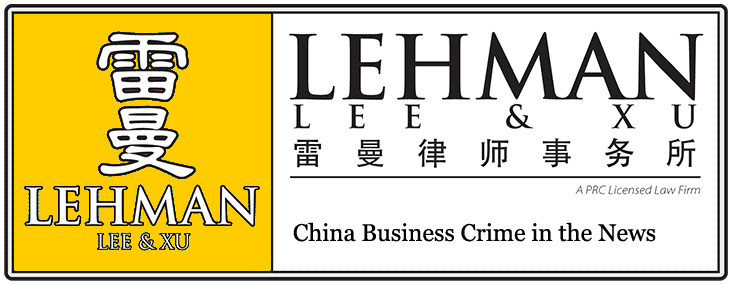Canadian securities regulators and law enforcement authorities grappling with a series of “challenges” posed by offshore companies listed on Canadian markets — mostly from China — may find some solace in that country’s zero-tolerance policy on commercial corruption.
On Nov. 9, Wu Jianwen, 42, the former president of the state-owned Shanghai Pharmaceutical Group was sentenced to death by a Shanghai court, with a two-year reprieve, for taking about $1.8-million in bribes and embezzling another $5-million over a 10-year period.
In September, a court in eastern China’s Shandong Province handed down a sentence of capital punishment against Wang Huayuan, who was convicted of taking bribes, abuse of power and for failing to explain the source of his personal assets.
And in July, two former senior Chinese government officials were executed following their convictions on corruption charges, marking the highest punishment meted out in recent years as the ruling Communist Party tackles public-resentment toward rampant graft in the world’s second-largest economy.
The two officials, former vice mayors of the prosperous eastern cities of Hangzhou and Suzhou, have been accused of taking millions of dollars in bribes in awarding contracts in the cities’ booming real estate markets.
Although most death sentences in China are commuted to life in prison with good behavior, these punishments provide an interesting contrast to Canada’s treatment of white-collar crime.
To wit, Garth Drabinsky is appealing a five-year prison sentence — which will actually work out to less than 14 months in jail — for orchestrating an accounting fraud that cost investors of Livent Inc. about $500 million.
Most of the punishment meted out by Chinese courts involves government officials and those employed in state-owned entities.
However, according to an international survey on corruption, it still has an uphill climb. On a scale from 10 (highly clean) to zero (highly corrupt), China ranked 78 out of 178 countries examined in the Transparency International Corruption Perception Index last year. The global survey ranks countries by their perceived levels of corruption, as determined by expert assessment and opinion surveys.
Canada ranked sixth best among all countries in the survey, led by Denmark, New Zealand, Singapore, Finland and Sweden. The United Kingdom ranked 20th and the United States was 22nd. The worst perceived corruption offenders in the survey were Somalia, which ranked last, Myanmar, Afghanistan and Iraq.
It’s against this backdrop that the Ontario Securities Commission is conducting a targeted review of emerging-market companies listed in Canada, focusing on 24 issuers from different industries and geographic areas. The OSC’s goal is to develop new policy to handle some of the problems raised by clashing business practices, co-operation among regulators and how to enforce Canadian securities laws and regulations internationally.
In recent months, Canada’s top securities watchdog halted trading in high-profile cases involving offshore companies, including Sino-Forest Corp., which has timber operations in mainland China, and was the largest forestry company listed on the Toronto Stock Exchange at the time a cease trade order was issued in August. The company is also the subject of investigation by the RCMP.
On Tuesday, an independent committee of Sino-Forest’s board of directors issued a 111-page interim report refuting the fraud allegations leveled against the company by research firm Muddy Waters LLP. However, the panel of independent directors acknowledged they were unable to verify title ownership to no more than 18% of the company’s stated assets.
In the case of Zungui Haixi Corp., a Hong Kong-based sportswear company, the stock remains halted on the TSX Venture Exchange because no one from the firm showed up at a hearing before the OSC to oppose the cease trade order.
The trading ban, which was issued in September after Ernst & Young LLP suspended an audit of Zungui, was extended until a hearing Nov. 23 into allegations from OSC staff against Zungui’s chief executive Yanda Cai and chairman Fengyi Cai for failing to co-operate with the company’s audit and special committees and the securities watchdog.
http://business.financialpost.com/2011/11/18/chinas-corruption-crackdown-nets-death-sentences-amid-osc-probe/
|

